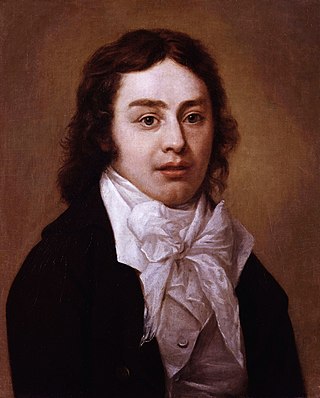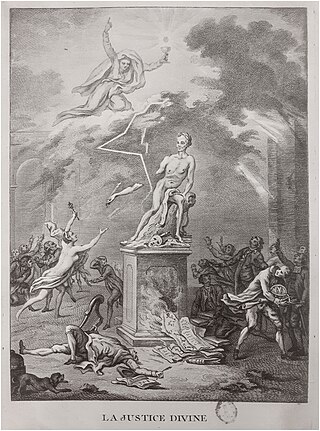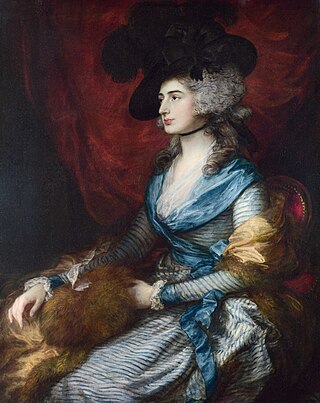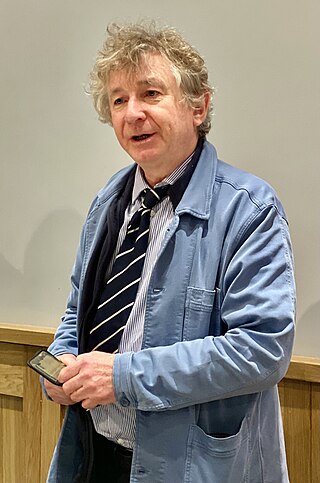Related Research Articles

Romanticism was an artistic and intellectual movement that originated in Europe towards the end of the 18th century. The purpose of the movement was to advocate for the importance of subjectivity, imagination, and appreciation of nature in society and culture in response to the Age of Enlightenment and the Industrial Revolution.

Samuel Taylor Coleridge was an English poet, literary critic, philosopher, and theologian who was a founder of the Romantic Movement in England and a member of the Lake Poets with his friend William Wordsworth. He also shared volumes and collaborated with Charles Lamb, Robert Southey, and Charles Lloyd.

German Romanticism was the dominant intellectual movement of German-speaking countries in the late 18th and early 19th centuries, influencing philosophy, aesthetics, literature, and criticism. Compared to English Romanticism, the German variety developed relatively early, and, in the opening years, coincided with Weimar Classicism (1772–1805).

Georg Philipp Friedrich Freiherr von Hardenberg, pen name Novalis, was a German aristocrat and polymath, who was a poet, novelist, philosopher and mystic. He is regarded as an influential figure of Jena Romanticism.

The Counter-Enlightenment refers to a loose collection of intellectual stances that arose during the European Enlightenment in opposition to its mainstream attitudes and ideals. The Counter-Enlightenment is generally seen to have continued from the 18th century into the early 19th century, especially with the rise of Romanticism. Its thinkers did not necessarily agree to a set of counter-doctrines but instead each challenged specific elements of Enlightenment thinking, such as the belief in progress, the rationality of all humans, liberal democracy, and the increasing secularisation of European society.

Romantic poetry is the poetry of the Romantic era, an artistic, literary, musical and intellectual movement that originated in Europe towards the end of the 18th century. It involved a reaction against prevailing Enlightenment ideas of the 18th century, and lasted approximately from 1800 to 1850. Romantic poets rebelled against the style of poetry from the eighteenth century which was based around epics, odes, satires, elegies, epistles and songs.
Joel Black is a Professor of Comparative Literature at the University of Georgia in Athens, Georgia. Black has written extensively on subfields of literature and film studies areas such as romanticism, postmodernism, philosophy and history of science, and cultural studies. He is the author of The Aesthetics of Murder: A Study in Romantic Literature and Contemporary Culture (1991) and The Reality Effect: Film Culture and the Graphic Imperative (2002).

19th-century science was greatly influenced by Romanticism, an intellectual movement that originated in Western Europe as a counter-movement to the late-18th-century Enlightenment. Romanticism incorporated many fields of study, including politics, the arts, and the humanities.
John Bernard Beer was a British literary critic. He was emeritus professor of English literature at the University of Cambridge and a fellow of Peterhouse, Cambridge. Best known as a scholar and critic of Romantic poets – especially William Blake, Samuel Taylor Coleridge, and William Wordsworth – he also published on E. M. Forster. He was elected a fellow of the British Academy in 1994.
The Destruction of the Bastile was composed by Samuel Taylor Coleridge in 1789. The poem describes Coleridge's feelings of hopes for the French Revolution as a catalyst for political change.
"To the River Otter" is a sonnet by Samuel Taylor Coleridge. Though its date of creation is uncertain, it was possibly composed in 1793. It deals with the image of the River Otter, near Coleridge's childhood home in Devon.
Sonnets on Eminent Characters or Sonnets on Eminent Contemporaries is an 11-part sonnet series created by Samuel Taylor Coleridge and printed in the Morning Chronicle between 1 December 1794 and 31 January 1795. Although Coleridge promised to have at least 16 poems within the series, only one addition poem, "To Lord Stanhope", was published.

"To Mrs Siddons" was written by Samuel Taylor Coleridge and published in the 29 December 1794 Morning Chronicle as part of the Sonnets on Eminent Characters series. It describes Sarah Siddons, an actress Coleridge became fond of during his visits to London during college. The poem celebrates watching Siddons perform her various roles on stage. The actual authorship of the poem is uncertain, since it was attributed to Charles Lamb in various works. It is possible that Lamb and Coleridge worked on the poem together, and, if so, it would be one of Lamb's earliest works.

"To Southey" or "To Robert Southey" was written by Samuel Taylor Coleridge and published in the 14 January 1795 Morning Chronicle as part of his Sonnets on Eminent Characters series. Robert Southey became a close friend of Coleridge during the summer of 1794 and the two originally formed a plan to start an ideal community together. Although the plan fell apart, Coleridge dedicated the poem to his friend and emphasized Southey's poetic abilities. Following the poem, Coleridge further drifted from Southey and the poem was not republished.

"To Sheridan" or "To Richard Brinsley Sheridan" was written by Samuel Taylor Coleridge and published in the 29 January 1795 Morning Chronicle. As the last poem running as part of the Sonnets on Eminent Characters series, it describes Coleridge's appreciation of Richard Brinsley Sheridan and his theatre talents. Coleridge, unlike most, preferred Sheridan's somber works over his comedies and emphasizes them within the poem. Coleridge also respects Sheridan's political actions.
Peter J. Kitson is a British academic and author. He is a Professor of Romantic Literature and Culture at the University of East Anglia where he teaches and researches the literature and culture of the British Romantic era.

Christoph Bode is a literary scholar. His fields are British and American literature, comparative literature, literary theory, poetics, and travel writing, but he is mainly known as a romanticist and a narratologist. He was full professor and chair of Modern English Literature in the Department of English and American Studies at Ludwig-Maximilians-Universität München until his retirement in March 2018.

Romanticism was an artistic, literary, and intellectual movement that originated in Europe toward the end of the 18th century. Scholars regard the publishing of William Wordsworth's and Samuel Coleridge's Lyrical Ballads in 1798 as probably the beginning of the movement in England, and the crowning of Queen Victoria in 1837 as its end. Romanticism arrived in other parts of the English-speaking world later; in the United States, about 1820.

Nicholas Hugh Roe, FBA, FRSE is a scholar of English literature and an academic, specialising in romantic literature and culture. Since 1996, he has been Professor of English Literature at the University of St Andrews. After completing his undergraduate degrees and doctorate at Trinity College, Oxford, Roe joined St Andrews as a lecturer in English in 1985; he was promoted to reader in 1993.
The Opus Maximum was a set of philosophical manuscripts dictated by Samuel Taylor Coleridge to his friend and colleague, Dr Joseph Henry Green, between 1819 and 1823. It was not published in Coleridge's lifetime, finally emerging in the 2002 version edited by Thomas McFarland with the assistance of Nicholas Halmi.
References
- ↑ Gravil, Richard; Lefebure, Molly (1990-04-20). Coleridge Connection: Essays for Thomas Mcfarland. ISBN 9781349206674.
- ↑ Richard Berkeley, Coleridge and the Crisis of Reason (2007), 2-12.
- ↑ 4 Scholars Quit As Sex Incident Splits Princeton New York Times, 1989-05-10.
- ↑ Accused Princeton Professor to Retire Early New York Times, 1989-05-27.
- ↑ Gravil, Richard (1990). The Coleridge Connection: Essays for Thomas McFarland. Palgrave.